- Home
- W. Somerset Maugham
(1941) Up at the Villa Page 3
(1941) Up at the Villa Read online
Page 3
`That's a strange thing to say at your age.’
They were well out in the country now, on a narrow road; the full moon shone down from an unclouded sky. She stopped the car.
`You see, I was madly in love with my husband. They told me I was a fool to marry him; they said he was a gambler and a drunkard; I didn't care. He wanted me to marry him so much. He had plenty of money then, but I'd have married him if he hadn't had a cent. You don't know how charming he was in those days, so good to look at, so gay and light-hearted. The fun we used to have together! He had immense vitality. He was so kind and gentle and sweet - when he was sober. When he was drunk he was noisy and boastful and vulgar and quarrelsome. It was terribly distressing; I used to be so ashamed. I couldn't be angry with him; he was so sorry afterwards; he didn't want to drink; when he was alone with me he was as sober as anyone, it was only when there were other people there that he got excited, and after two or three drinks there was no holding him; then I used to wait till he was so blasé that he let me lead him away and at last I could put him to bed. I did everything I knew to cure him, it was useless; it's no good. I don't believe a drunk can ever be cured. And I was forced into the position of nurse and keeper. It irritated him beyond endurance when I tried to restrain him, but what else could I do? It was so difficult, I didn't want him to look upon me as a sort of governess, but I had to do what I could to keep him from drinking. Sometimes I couldn't help flying into a passion with him and then we'd have an awful row. You see, he was a dreadful gambler and when he was drunk he'd lose hundreds of pounds. If he hadn't died when he did he'd have gone bankrupt and I should have had to go back to the stage to keep him. As it is I have a few hundreds a year and the bits and pieces of jewellery he gave me when we were first married. Sometimes he wouldn't come back all night and then I knew he'd got blind and picked up the first woman he met. At first I used to be furiously jealous and unhappy, but at last I got to prefer it, for if he didn't do that he'd come home and make love to me with his breath stinking of whisky, all hunched up, his face distorted, and I knew it wasn't love that made him passionate but drink, just drink. I or another woman, it made no difference, and his kisses made me sick and his desire horrified and mortified me. And when he'd satisfied his lust he'd sink into the snoring sleep of drunkenness. You're surprised that I should say I was fed to the teeth with love. For years I only knew the humiliation of it.’
`But why didn't you leave him?’
`How could I leave him? He was so dependent on me. When anything went wrong, if he got into trouble, if he was ill, it was me he came to for help. He clung to me like a child.’
Her voice broke.
`He was so broken then that my heart bled for him. Though he was unfaithful to me, though he hid himself from me so that he could drink without restraint, though I exasperated him sometimes so that, he hated me, deep down he always loved me, he knew I'd never let him down and he knew that except for me he'd go all to pieces. He was so beastly when he was drunk he had no friends, only the riff-raff that sponged on him and bled him and robbed him; he knew I was the only person in the world who cared if he lived or died and I knew that I was the only person who stood between him and absolute ruin. And when he died, in my arms, I was broken-hearted.’
The tears were flowing down Mary's face and she made no effort to restrain them. Rowley, thinking perhaps that it would relieve her to cry, sat still and said no word. Presently he lit a cigarette.
`Give me one too. I'm being stupid.’
He took a cigarette out of his case and handed it to her.
`I'd like my handkerchief. It's in my bag.’
The bag was between them and when he opened it to find her handkerchief he was surprised to feel a revolver.
`What have you got a gun here for?”
‘Edgar didn't like the idea of my driving about alone. He made me promise to take it. I know it's idiotic.’
But the new subject that Rowley had brought up helped her to regain her self-control.
`I'm sorry to have got so emotional.’
`When did your husband die?’
`A year ago. And now I'm thankful he died. I know now that my life was wretched with him and he had nothing to look forward to but hopeless misery.’
`He was young to die, wasn't he?'
'He was smashed up in a motor accident. He was drunk. He was driving at sixty miles an hour and skidded on a slippery road. He died in a few hours. Mercifully I was able to get to him. His last words were: "I've always loved you, Mary."' She sighed.
`His death has given us both freedom.’
For a little while they sat and smoked in silence. Rowley lit another cigarette on the stub of the first.
`Are you sure you're not committing yourself to a slavery just as great when you marry a man who means nothing to you?' he asked, as though their conversation had gone on without interruption.
`How well do you know Edgar?’
`I've met him fairly often during the five or six weeks he's been here dangling at your skirts. He's the Empire builder; it's not a type that has ever very much appealed to me.’
Mary giggled.
`No, I should hardly think it would. He's-strong, he's clever, he's trustworthy.’
`Everything I'm not, in short.’
`Can't we leave you out of it for the minute?’
`All right. Go on with his virtues.’
`He's kind and considerate. He's ambitious. He's a man who has done great things and he'll do still greater in future. It may be I can help him. I can't hope that you'll think it anything but idiotic when I tell you that I should like to be of some use in the world.’
`You haven't got a very good opinion of me, have you?’
`No, I haven't' chuckled Mary.
`I wonder why?’
`If you'd like to know I'll tell you, she answered coolly.
`Because you're a waster and a rotter. Because you think of nothing but having a good time and as many women as are fools enough to fall for you.’
`I look upon that as a very accurate description. I was lucky enough to inherit an income which made it unnecessary for me to earn my living. Do you think I should have got some job that would have taken the bread out of the mouth of a poor devil who needed it? So far as I know I've only got this one life to dispose of. I like it awfully. I'm in the fortunate position of being able to live for living's sake. What a fool I should be if I didn't make the most of my opportunities! I like women, and strangely enough they like me. I'm young and I know youth doesn't last for ever. Why shouldn't I have as good a time as I can while I have the chance?’
`It would be hard to find a greater contrast to Edgar.’
`I agree. It may be that I'd be easier to live with. I should certainly be more fun.’
`You forget that Edgar wishes to marry me. You are suggesting a much more temporary arrangement.’
`What makes you think that?’
`Well, for one thing, you happen to be married already.’
`That's where you're mistaken. I was divorced a couple of months ago.’
`You kept very quiet about it’
`Naturally. Women have funny ideas about marriage. It makes things easier all round if there's never any question of that. We all know where we are then.’
`I see your point,' smiled Mary.
`Why should you divulge this guilty secret to me? With the idea that if I behaved myself and gave satisfaction you might in due course reward me with a wedding ring?’
`Darling, I'm quite intelligent enough to know you're no fool.’
`You need not call me darling.’
`Damn it all, I'm in process of making you a proposal of marriage.’
`Are you? Why?’
`I don't think it's a bad idea. Do you?’
`Rotten. What on earth put it in your head?’
`It just occurred to me. You see, when you told me about your husband I suddenly realized that I was terribly fond of you. That's different from being in lov
e, you know, but I'm in love too. I feel a great tenderness towards you.’
`I'd rather you didn't say things like that. You are a devil, you seem to know instinctively what to say to melt a woman.’
`I couldn't say them if I didn't feel them.’
`Oh, shut up. It's lucky for you that I have a cool head and a sense of humour. Let's go back to Florence. I'll drop you at your hotel.’
`Does that mean the answer is no?’
`It does.’
`Why?’
`I'm sure it'll surprise you; I'm not in the least in love with you.’
`It doesn't surprise me. I knew it; but you would be if you gave yourself half a chance!’
`Modest fellow, aren't you? But I don't want to give myself half a chance!’
`Are you determined to marry Edgar Swift?’
`Now I am, yes. Thank you for letting me talk to you. It was hard having no one I could talk to. You've helped me to make up my mind.’
`I'm damned if I see how.’
`Women don't reason in the same way that men do. All you've said, all I've said, the recollection of the life with my husband, the misery, the mortification - well, against that Edgar stands like a great rock; he's so strong and so staunch. I know I can rely on him; he'd never let me down, because he couldn't. He offers me security. I have so great an affection for him at this moment that it's almost love’
`It's rather a narrow road,' said Rowley; `would you like me to turn the car for you?’
`I'm perfectly capable of turning my own car, thank you,' she answered. His remark had given her a moment's irritation, not because it reflected on her driving, but because for some reason it made what she had just said seem a trifle high-flown. He chuckled.
`There's a ditch on one side and a ditch on the other. I shall be vexed if you pitch me into either one or the other.’
`Hold your bloody tongue,' she said. He lit a cigarette and watched her as she advanced, turned the wheel with an effort of all her strength, stopped the engine and started it again, put the clutch in reverse and gingerly backed, grew very hot, and eventually got the car round and set off on the homeward journey. They drove in silence till they reached the hotel. It was late now and the door was shut. Rowley made no attempt to get out.
`Here we are,' said Mary.
`I know.’
He sat silent for a moment or two staring straight in front of him. She gave him a questioning look and with a smile he turned to her.
`You're a fool, Mary, my dear. Oh, I know, you've turned me down. That's all right. Though I dare say I'd have made a better husband than you think. But you're a fool to marry a man twenty-five years older than yourself. How old are you? Thirty at the outside. You're not a fish. One only has to look at your mouth and the warmth of your eyes, and at the lines of your body, to know that you're a passionate and sensual woman. Oh, I know you had a rotten break. But at your age one recovers from those things; you'll fall in love again. D'you think you can ignore your sexual instincts? That beautiful body of yours is made for love; it won't allow you to deny it. You're too young to shut the door on life.’
`You disgust me, Rowley. You talk as though bed were its aim and end.’
`Have you never had a lover?’
`Never.’
`Many men besides your husband must have loved you.’
`I don't know. Some have said they did. You can't think how little they meant to me. I can't say I've resisted temptation; I've never been tempted.’
`Oh, how can you waste your youth and beauty? They last so short a time. What's the good of riches if one does nothing with them? You're a kind woman and a generous one. Haven't you ever the desire to give of your riches?' Mary was silent for an instant.
`Shall I tell you something? I’m afraid you'll think me even more foolish than you do.’
`Very possibly. But tell me all the same.’
`I should be a fool if I didn't know I was prettier than most women. It's true that sometimes I felt that I had something to give that might mean a great deal to the person I gave it to. Does that sound frightfully conceited?’
`No. It's the plain truth.’
`I've had a lot of time to myself lately and I dare say I've wasted too much of it on idle thoughts. If ever I'd taken a lover it wouldn't have been a man like you. My poor Rowley, you're the last man I would ever have had an affair with. But I've sometimes thought that if I ever ran across someone who was poor, alone and unhappy, who'd never had any pleasure in life, who'd never known any of the good things money can buy - and if I could give him a unique experience, an hour of absolute happiness, something that he'd never dreamt of and that would never be repeated, then I'd give him gladly everything I had to give.’
`I never heard such a crazy idea in my life!’
` cried Rowley.
`Well, now you know,' she answered brightly.
`So get out and let me drive home.’
`Will you be all right alone?’
`Of course.’
`Then good night. Many your Empire-builder and be damned to you.’
4
M A R Y drove through the streets of Florence, along the road by which she had come, and then up the hill on the top of which was the villa. The hill was steep and wound sharply with horse-shoe turns. About half-way up was a little semicircular terrace, with a tall, very old cypress and a parapet in front, from which one got a view of the cathedral and the towers of Florence. Tempted by the beauty of the night Mary stopped the car and got out. She walked to the edge and looked over. The sight that met her eyes, the valley flooded with the full moon under the vastness of the cloudless sky, was so lovely that it wrung her heart with a throb of pain. Suddenly she was aware that a man was standing in the shadow of the cypress. She saw the gleam of his cigarette. He came towards her. She was a trifle startled, but had no intention of showing it. He took off his hat.
`Excuse me, are you not the lady who was so generous in the restaurant?' he said.
`I should like to thank you.’
She recognized him.
`You are the violinist.’
He no longer wore that absurd Neapolitan costume, but nondescript clothes which looked threadbare and dingy. He spoke English well enough but with a foreign accent.
`I owed my landlady for my board and lodging. The people I live with are very good to me, but they are poor and they aced the money. Now I shall be able to pay them.’
`What are you doing here?’ asked Mary.
`It is on my way home. I stopped to look at the view.’
`Do you live near here, then?’
`I live in one of the cottages just before you come to your villa.’
`Flow do you know where I live?’
`I've seen you passing in your car. I know that you have a beautiful garden and there are frescoes in the villa.’
`Have you been in it?’
`No. How should I? The contadini have told me about it.’
Mary had lost the slight nervousness which she had had for a moment. He was a pleasant-spoken, rather shy young man; she remembered how ill at ease he had looked in the restaurant `Would you like to come and see the garden and the frescoes?' she said.
`It would give me much pleasure. When would it be convenient?' Rowley and his unexpected proposal of marriage had amused and excited her. She had no wish to go to bed.
`Why not now?’ she said on an impulse.
`Now?' he repeated, surprised.
`Why not? The garden is never so beautiful as under the full moon.’
`I should be very pleased,' he said primly.
`Jump into the car. I'll drive you up.’
He took his seat by her side. She continued on her way and they came to a group of cottages huddled together.
`That is where I live,' he told her. She slowed down and looked reflectively at the poverty-stricken little houses. They were horribly sordid. She drove on and presently they came to the gates of her villa. They stood open and she drove in. She parked
the car and they walked up the narrow drive. The principal rooms and Mary's bedroom were on the second floor, to which you ascended by a fine flight of steps. She opened the door and turned on the lights. There was nothing much to see in the hall and she took the young man straight into the drawing-room with the painted walls. It was a noble apartment and the owners of the villa had furnished it with period pieces of fine quality. Flowers arranged in great vases mitigated its stately severity. The frescoes were somewhat damaged and had been none too well restored, but with all those figures in their sixteenth century clothes they gave an impression of a multifarious and magnificent vitality.
`Wonderful, wonderful!' he cried.
`I didn't think one ever saw such things except in a museum. I never realized that people could possess them.’
It gave her a thrill to see his delight. She did not think it necessary to tell him that there was not a chair in which you could sit with comfort or that, with those marble floors and that vaulted ceiling, except in the warmest of warm weather you shivered with cold.
`And is it all yours?' he asked.
`Oh no. It belongs to friends of mine. They've lent it to me while they're away.’
`I'm sorry. You are beautiful and it's right that you should possess beautiful things.’
`Come along,' she said, `and I'll get you a glass of wine and then well go and look at the garden.’
`No, I had no dinner. Wine would go to my head.’
`Why did you have no dinner?' He gave a careless, boyish laugh.
`I had no money. But never mind about that; I shall eat tomorrow., 'Oh, but that's awful. Come into the kitchen and we'll see if we can't find something for you to eat now.’
`I'm not hungry. This is better than food. Let me see the garden with the moon shining.’
The garden will keep and so will the moon. I'm going to make you some supper and then you shall see anything you like.’
They went down into the kitchen. It was vast, with a stone floor and a huge old-fashioned range where you might have cooked for fifty people. Nina and Ciro were long since in bed and asleep and the cook had gone home to her cottage halfway down the hill. Mary and the stranger, hunting about for food, felt like a pair of burglars. They found bread and wine, eggs, bacon and butter. Mary turned on the electric stove which the Leonards had put in, started to toast some slices of bread and broke the eggs into a frying-pan to scramble them.

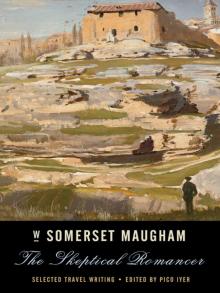 The Skeptical Romancer: Selected Travel Writing
The Skeptical Romancer: Selected Travel Writing The Summing Up
The Summing Up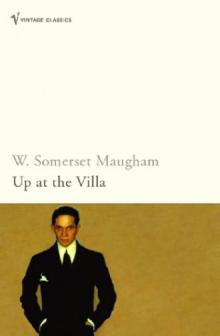 Up at the Villa
Up at the Villa The Razor's Edge
The Razor's Edge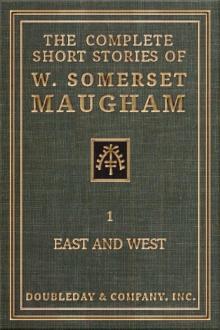 The Complete Short Stories of W. Somerset Maugham: East and West (Vol. 1 of 2))
The Complete Short Stories of W. Somerset Maugham: East and West (Vol. 1 of 2))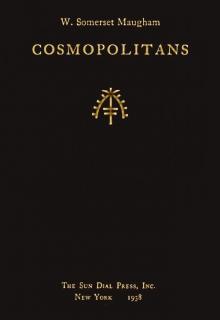 Cosmopolitans
Cosmopolitans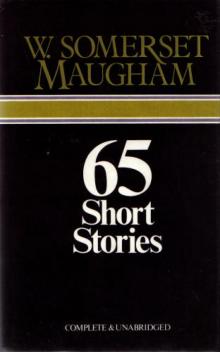 65 Short Stories
65 Short Stories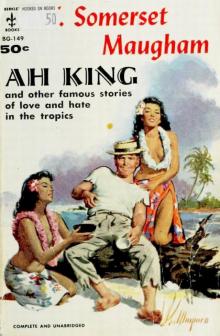 Ah King (Works of W. Somerset Maugham)
Ah King (Works of W. Somerset Maugham)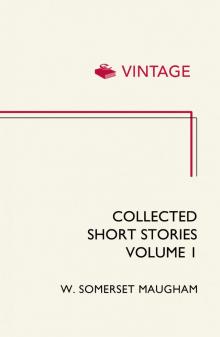 Collected Short Stories: Volume 1
Collected Short Stories: Volume 1 Collected Short Stories Volume 2
Collected Short Stories Volume 2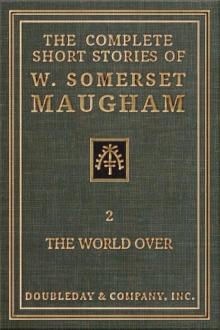 The Complete Short Stories of W. Somerset Maugham - II - The World Over
The Complete Short Stories of W. Somerset Maugham - II - The World Over Collected Short Stories Volume 4
Collected Short Stories Volume 4 Theatre
Theatre Short Stories
Short Stories Then and Now
Then and Now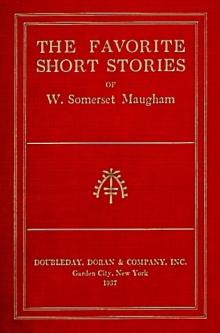 The Favorite Short Stories of W. Somerset Maugham
The Favorite Short Stories of W. Somerset Maugham Of Human Bondage
Of Human Bondage The Magician
The Magician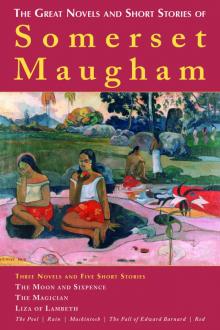 The Great Exotic Novels and Short Stories of Somerset Maugham
The Great Exotic Novels and Short Stories of Somerset Maugham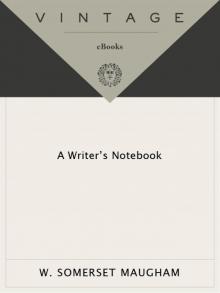 A Writer's Notebook
A Writer's Notebook Christmas Holiday
Christmas Holiday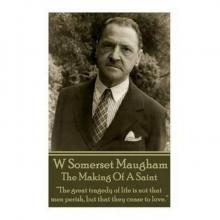 The Making of a Saint
The Making of a Saint Merry Go Round
Merry Go Round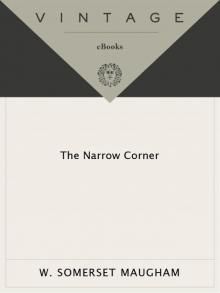 The Narrow Corner
The Narrow Corner Collected Short Stories Volume 3
Collected Short Stories Volume 3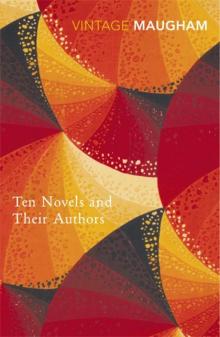 Ten Novels and Their Authors
Ten Novels and Their Authors Ashenden
Ashenden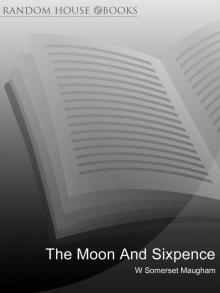 The Moon and Sixpence
The Moon and Sixpence Cakes and Ale
Cakes and Ale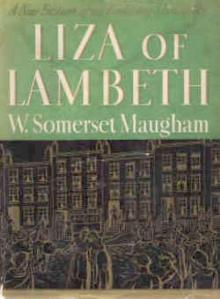 Liza of Lambeth
Liza of Lambeth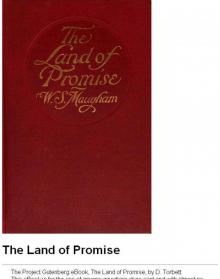 The Land of Promise: A Comedy in Four Acts (1922)
The Land of Promise: A Comedy in Four Acts (1922)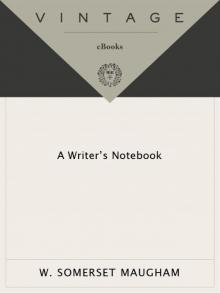 A Writer's Notebook (Vintage International)
A Writer's Notebook (Vintage International)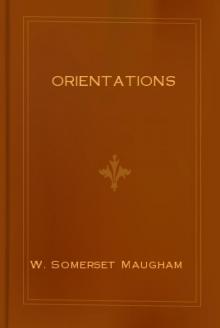 Orientations
Orientations Selected Masterpieces
Selected Masterpieces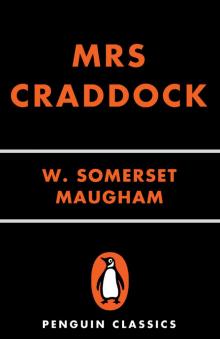 Mrs Craddock
Mrs Craddock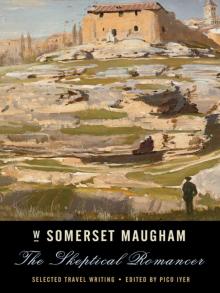 The Skeptical Romancer
The Skeptical Romancer On a Chinese Screen
On a Chinese Screen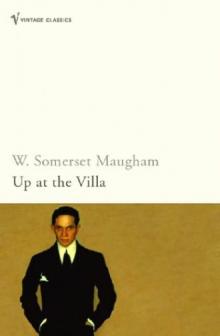 (1941) Up at the Villa
(1941) Up at the Villa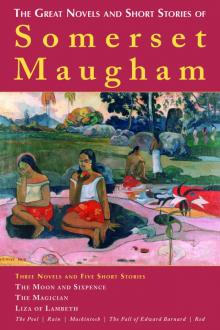 The Great Novels and Short Stories of Somerset Maugham
The Great Novels and Short Stories of Somerset Maugham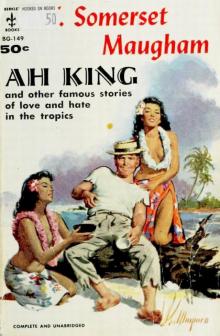 Ah King
Ah King The Explorer
The Explorer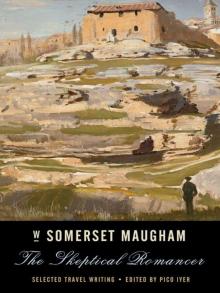 The Skeptical Romancer: Selected Travel Writing (Vintage Departures)
The Skeptical Romancer: Selected Travel Writing (Vintage Departures)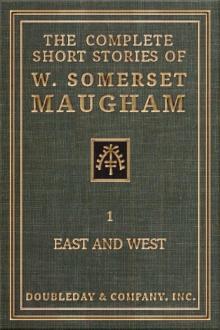 The Complete Short Stories of W. Somerset Maugham - I - East and West
The Complete Short Stories of W. Somerset Maugham - I - East and West